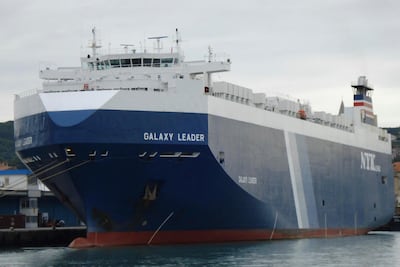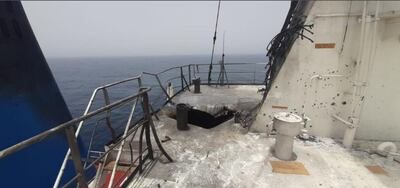Live updates: Follow the latest news on Israel-Gaza
The hijacking of a commercial vessel by the Houthis could lead to a dangerous crisis in the Red Sea, analysts have warned, as the Iran-backed group's attacks threaten to disrupt shipping in a waterway through which 10 per cent of global trade passes.
The Houthis, who support Hamas in the continuing Israel-Gaza war, seized the Israeli-linked Galaxy Leader commercial vessel and took 25 hostages of various nationalities in the Red Sea on Sunday. A spokesman for the group announced it had carried out a “military operation” and all Israeli ships in the Red Sea would be targeted in a “sea battle”.
“The detention of the Israeli ship is a practical step that proves the seriousness of the Yemeni armed forces in waging the sea battle, regardless of its costs,” said Mohammed Abdul-Salam.
The Houthis released footage reportedly showing the raid being carried out.
The video, which was tweeted by the Houthis but has not been independently verified, shows a helicopter painted with Yemeni and Palestinian flags approaching a ship that appears to be the Galaxy Leader. Armed men then drop on to the ship and travel from room to room, taking crew members hostage.
A US official at the State Department told The National that the seizure was “a flagrant violation of international law”.
“We demand the immediate release of the ship and its crew. We will consult with the our allies and UN partners as to appropriate next steps,” the official said.
The Houthis are known to possess a small number of helicopters, ageing Soviet-era MI-17s captured off the government during their rebellion, but they have rarely been used in operations.
Analysts say the attack could trigger a wider escalation in the Red Sea, an important international shipping route that ends in the Bab el Mandeb strait, through which about 6 million barrels of oil a day travels.
“This escalation by Houthis, who are in control of Yemen's capital and some regions amid a civil war, is mainly connected to the war in Gaza, yet it poses a threat to international shipping overall in one of the key maritime trading routes,” says Osamah Rawhani, a conflict analyst at the Sanaa Centre, a think tank.
Israel's military denied the ship was Israeli.
The Galaxy Leader is operated by the Japanese company NYK line. It belongs to Ray Car Carriers, registered in Britain's Isle of Man but owned by Israeli billionaire shipping mogul Abraham “Rami” Ungar.
Mr Ungar told the Associated Press that he knew of the hijacking incident but did not comment further. NYK said the ship's crew members were from the Philippines, Ukraine, Bulgaria, Romania and Mexico.

Houthi threat to Israel and US
The heavily armed Iran-backed militia group has emerged as a threat to Israel despite being 1,600km away.
Both the Houthis and the Hamas group that controls Gaza are supported by Iran.
Since the outbreak of the Israel-Gaza war on October 7, the Houthi movement has fired salvoes of missiles and drones towards Israel, with many being intercepted by the USS Carney last month.
While it is not the first time Houthis have attacked civilian vessels in the area, the seizure of a ship as large as the Galaxy Leader is a first for the group.
Analysts warned it might be the a prelude to many such attacks.
“Although this was a way to send political messages to the US and Israel, Houthis might repeat this behaviour with other shipping vessels as a means of pressure to achieve political gains of their own in the future, not only those connected to Gaza,” said Mr Rawhani.
“It is surprising that this behaviour was not immediately resisted despite the presence of the American fleet.”
Since October 7, the US has increased its naval forces in the Middle East, fearing a larger conflict. In the Red Sea, the US has sent the USS Bataan, which can carry troops and helicopters, and USS Carter Hall, which carries military equipment. The USS Thomas Hudner and USS Carney, both missile-armed warships, are also present.
The recent escalation comes after years of tension in the Red Sea.
The Houthis launched missiles at civilian aid ships as far back as 2016, leading to a stepped-up US naval presence and a brief clash between a US naval destroyer and the group, which resulted in American air strikes in Yemen. The Houthis then attacked Gulf-flagged shipping in 2017 and 2018.
In 2018, the US said the Houthis had “publicly threatened to attack international commercial maritime traffic in the Red Sea”.
Attacks continued in 2019, with the group seizing a South Korean drilling rig and two tug boats, although they were later released along with their crews following negotiations. More recent attacks include a 2022 drone attack on the Marshall Islands-flagged Nissos Kea near Yemen’s port of Ash Shihr.
The Houthis are now adept at “moving of weapons and units to Yemeni islands under their control, and setting up sea mines, missiles that hit ships, and rocket/missile stations atop the mountain ranges closer to the sea”, said Maged Al Madhaji, a regional analyst also at the Sanaa Centre.
“This will mean higher escalations in terms of targeting and hitting more military vessels, in addition to hijacking civilian ships,” he said.
Iran's role
Sunday’s attack also echoes Iranian actions against commercial shipping in Middle Eastern waters.
Iran has launched sporadic attacks against shipping since 2018 after US President Donald Trump launched his “maximum pressure” sanctions campaign against Tehran.
Despite the Biden administration easing some sanctions and trying to re-enter a nuclear deal that would ease pressure on Iran’s economy, attacks have continued as restrictions on Iranian oil exports remain.
In June 2021, the US blamed Iran for attacking Mercer Street, a ship also linked to an Israeli business. A British and a Romanian sailor were killed in the attack.

The lethal drone attack was one of five attacks on commercial ships linked to Israel, many using drones, in 2021 and 2022.
Around the same time, Iran seized several oil tankers belonging to companies it said were carrying fuel bound for America. Iran said it was retaliating for the US seizure of ships carrying oil from Iran, which the US said breached energy sanctions.
“One month into the conflict, pro-Iranian armed groups in the Middle East appear to be approaching the Gaza issue in a piecemeal fashion. The case of the Houthis raises questions. Is Tehran allowing its unpredictable Yemeni ally to act? Is it manipulating it? Or has Tehran lost control of this movement which, for the sake of expediency, seems to want to join the Gaza issue to remind the world of its existence?” says Pierre Boussel, associate fellow at France's Fondation pour la Recherche Strategique.
“Let's not forget that the Houthis have always been Iran's transactional allies. They are not puppets. They want to keep their freedom of initiative,” he says.
The US and allies, including the UK, stepped up naval task-force patrols to secure civilian shipping, and while incidents have occurred, such as the shining of a laser by an Islamic Revolutionary Guard Corps boat at a US helicopter last month, gunfire has not been exchanged.
Iran's actions against civilian shipping have nonetheless drawn strong condemnation.
In a similar raid to the Houthi hijacking on Sunday, IRGC commandos seized the Turkish-owned Advantage Sweet oil tanker in July, rappelling down from helicopters. A similar raid in 2019 seized the UK-flagged Stena Impero oil tanker.
“If the US wants to maintain its status as the world's leading naval power, it will have to increase its presence in the region,” Mr Boussel says.
“Now, let's be nuanced. While the Houthis pose an ongoing threat to maritime security in the Persian Gulf, there is no evidence that they have enough surface-to-surface missiles to mount a long-term campaign of 'swarm attacks' against Israel – the only kind that would be effective in breaking Iron Dome. It is more likely that they will quickly revert to what they really know how to do: naval gangsterism. Attacking merchant ships. Kidnapping crews. Hijacking ships.”
